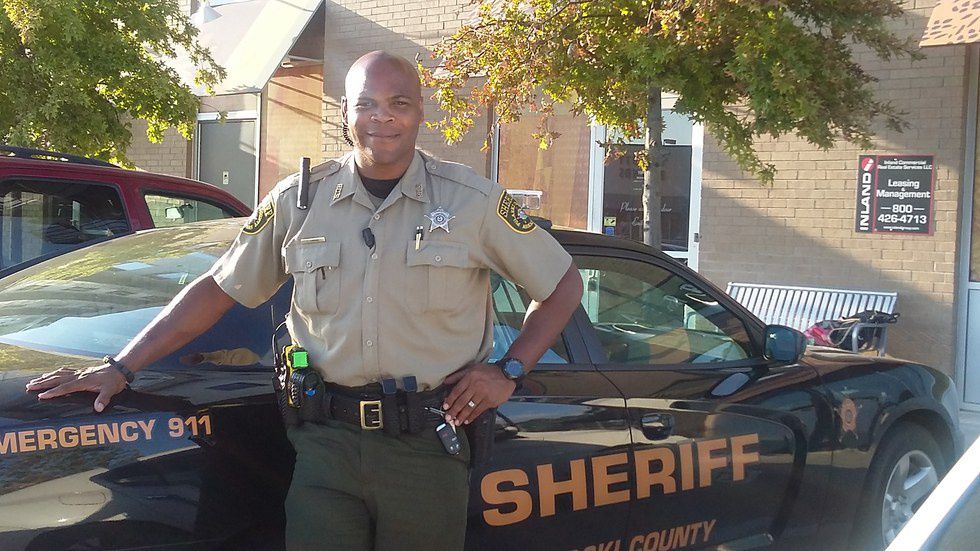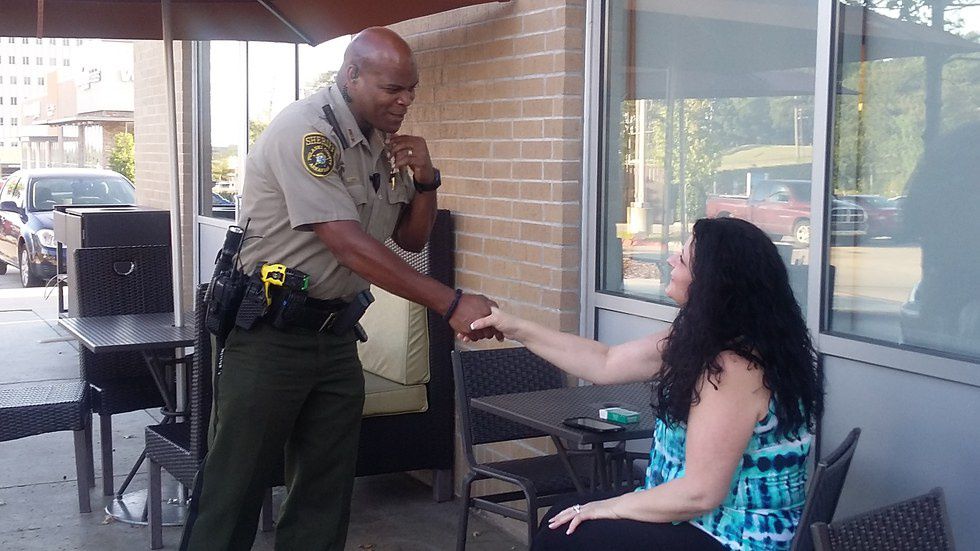Photography by De'Jarnette K. Johnson
I was introduced to Officer Paris Simmons through another officer on the force. She described him to me as "larger than life". Upon my first encounter with him, I asked Officer Simmons why this was an accurate depiction. He began, "Because I think anyone that knows me would agree that I'm over the top. Anything that I do, I try to go above and beyond because that's what I would want if I were in trouble." And thus, our conversation began.
Answering the Call
In the past several weeks, I've had the opportunity to speak with countless officers who decided to go into law enforcement. Most often, they've stated to me that the decision was not so much a career move, but rather a calling. Simmons, a patrolman for the Pulaski County Sheriff's Office for more than a decade says that he realized the calling over 10 years ago, but that he dismissed the idea for a more lucrative career in sales. He spoke to me about the deciding factor that ultimately led him to his passion.
"My heart and everything about my mechanism was saying that I need to be in this position. And I knew that if I fall into my calling, God would provide for me and my family." -Officer Paris Simmons
Faith Over Fear
One attribute that I'm always impressed with by men and women of service is their courage. I described my fears to Officer Simmons and wondered how is it that he's not consumed with fear. He assured me that because of his commitment to his calling and his faith in Christ, that he doesn't really think of the fear. He stated that while he understands the risk, he doesn't think about the possibility. He chooses to focus on the purpose.
"No matter what happens out here in the field, if I were to lose my life in a call of duty, I know that to be absent from my body is to be present with the Lord. "
Having met Officer Simmons, it's obvious that he places a high value on family and old school traditions. He explained that when he's not on patrol, you can likely find him spending time with his blended family which includes his newly-wed wife, two sons and 4 children from a previous marriage. Simmons emphasized the importance of family, citing how he recently lost his 20-year old daughter in fatal car accident in May. He declared that family time for them includes going to the movies, playing old-fashioned games such as UNO, bowling and family dinner every night, without the presence of t.v. or electronics. He says that while this was a struggle in the beginning, he's instilling the value of communication in his boys.
R-E-S-P-E-C-T
Not only does is this practice handy at the dinner table, likewise, Officer Simmons tells me that this is a simple tactic that he employs on every stop he makes.
"I talk to each person and each person is different. But when I go out in high-crime areas and I'm dealing with these young guys, my approach is to try to talk to them like we're men. I call them by their names instead of 'bro' or 'homeboy'. I'm trying to show respect as a man." -Officer Paris Simmons
The Boogeyman Effect
In my quest for answers on the tensions between law enforcement and the Black community, I asked Officer Simmons what were his thoughts on what seem to be an inherited fear of police officers, a concept that I've coined 'The Boogeyman Effect'. His response was a sad reality that I'd never taken the time to think about.
"Say you're standing in line and there's a family with a little kid who's acting up, Mama turns around and says 'You better be good or I'm going to tell him to take you away.' Or you'll see them in the stores and the mother will point and say, 'You see the police, he's going to get you.' But when you see Caucasian kids, they're parents encourage them to say 'Hey' and 'Wave at the police man. Shake his hand.' So now when I encounter that, I tell the mothers to stop telling them that we're going to take them away and start telling him that we are here to help. Because that's what you're engraining in them."
Simmons illustrates how children can be conflicted by the images they get from their parents and what they see outside the home. As children, we are raised to obey our parents. In that, we take their word without reproach, often using that as our very own moral compass in life. When negative images are given to us as children, they remain into our adulthood. Simmons chronicles the internal struggle within when children are introduced to law enforcement as "the bad guy", but then watch their parents call them during a crisis. He recounts a final story of a little boy that he recently encountered.
"I said to him, 'Hey, buddy. Don't cry.' I reached my hand out to him. He stood there, scared to touch my hand. I leave it out there for a minute and he finally touched my hand and what I'm hoping and praying for is that when he touches it, my spirit connects with him and he knows that I am not here to cause him any harm, and I'm not here to take him away. And if I'm in a store, I buy him some candy or something and give it to him so that way he has a positive experience and he knows that everything is okay."
I joked about this with Officer Simmons, although it does ring true, that God forbid I ever have to, but if I did find myself headed to the slammer, I'd want Officer Simmons to take me there.
LOVE THIS ARTICLE? SHARE IT WITH YOUR FRIENDS ON FACEBOOK.
And for more great reads, check out My blog!
Twitter @BlkCrrieBradshw Facebook #TheRealBlackCarrieBradshaw Instagram @TheRealBlackCarrieBradshawTumblr @ TheRealBlackCarrieBradshaw























